
ELISA Kits
- • Anemia ELISA kits
- • Allergy ELISA kits
- • Autoimmune Disease kits
- • Bone Metabolism ELISA kits
- • Blood bank ELISA kits
- • Cancer ELISA kits
- • Cardiac Markers ELISA kits
- • Diabetes Assays ELISA kits
- • Drug test ELISA kits
- • Fertility ELISA kits
- • Food ELISA kits
- • Infectious Disease ELISA kits
- • Other ELISA Kits
- • Parasitology ELISA kits
- • Steroid ELISA kits
- • Thyroid ELISA kits
Rapid Tests
- • Allergy Rapid tests
- • Bone Metabolism
- • Cancer Rapid tests
- • Cardiac markers Rapid tests
- • Drug Tests
- • Fertility Rapid tests
- • Hepatitis Panel
- • Infectious Disease & other tests
- • Other
- • Ovulation Rapid tests
- • Pregnancy tests
- • Urine Reagent Strips tests
IFA Kits
Chemiluminescence Immuno Assays
- • Allergy Assays
- • Autoimmune Thyroid Assays
- • Cardio-Vascular Monitoring
- • Diabetes Assays
- • Fertility Assays
- • Growth Deficiency
- • Infectious Disease Assays
- • Others
- • Steroid Assays
- • Thyroid Assays
- • Tumor Marker Assays
Serology Tests
- • ASO (Anti-Streptolysin-O)
- • CRP (C-Reactive Protein)
- • Mono (Infectious Mononucleosis)
- • RF (Rheumatoid Factor)
- • RPR (Rapid Plasma Reagin)
- • SLE (Systemic Lupus Erythematosus)
Instrumentation



HDV IgM ELISA kit
| Name |
HDV IgM ELISA kit |
|---|---|
| Full name |
Human Hepatitis D Virus (HDV) IgM ELISA Test Kit ,Export Use Only |
| Category Name | Infectious Disease ELISA kits |
| Test | 96 |
| Method | ELISA: Enzyme Linked Immunosorbent Assay |
| Principle | Indirect ELISA: Antigen Coated Plate |
| Detection Range | Qualitative: Positive; Negative control & Cut off |
| Sample | 100ul Serum |
| Specificity | 100% |
| Sensitivity | 100% |
| Total Time | ~ 75 min |
| Shelf Life | 12-18 Months from the manufacturing date |
 |
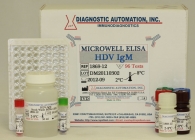 |
 |
HDV IgM ELISA kit description:
"Export Use Only"
Diagnostic Automation Inc. offers an HDV IgM ELISA kit, which is an enzyme-linked immunosorbent assay for the qualitative detection of IgM-class antibodies to hepatitis D virus in human serum or plasma. The HDV IgM ELISA test is designed for clinical lab diagnosis of patients who are suspected of having a hepatitis D virus (HDV) infection. The Sensitivity of the HBcAb IgM ELISA kit is 100% and the Specificity is 100%.
Materials Provided with HDV IgM ELISA kit
1. Microwell strips breakable:96 HDV IgM Elisa tests per plate
Each well contains anti-IgM antibodies
2. HDV IgM Elisa test Negative Control, non-reactive for HDV IgM
3. HDV IgM Elisa test Positive Control
Purified anti-HDV IgM antibodies diluted in protein-stabilized buffer
4. HRP-Conjugated HDV antigens
5. Specimen Diluent, Protein buffer solution
6. Stock Wash Buffer 20 x: 50 ml
7. Chromogen Solution A HDV IgM EIA Test
8. Chromogen Solution B HDV IgM EIA Test
9. Stop Solution
10. Plastic sealable Bag, 1unit
11. Cardboard Plate Cover, 2sheets
12. Package Insert
Materials & Instrumentations Required, not provided
1. Freshly distilled or deionized water
2. Dispensing system and/or pipette & tips
3. Dry incubator or water bath
4. Microshaker
5. EIA kit Microplate Washer
6. EIA kit Microplate Reader at 450nm wavelength
HDV IgM Elisa Kit Background Information:
What causes Hepatitis D virus is an agent known as Delta agent (a defective 36nm-43nm RNA virus) which puts it into the classification of Hepatitis delta virus. Hepatitis D can only reproduce when it is linked with Hepatitis B virus (HBV). The disease is transmitted through the skin or through sexual contact with infected blood. Generally, the relationship of HDV and HBV involves some of the most acute and chronic HBsAg carriers. Because of this co-infection, it is important to know whether the HDV and HBV developed at the same time, or if the patient was already a carrier of HBsAg. The co-infection, especially super-infected HDV, can develop into severe acute hepatitis disease. Chronically infected HBV patients infected with HDV have a 70-80% chance of developing cirrhosis of the liver. Serologically, it is important to know the specific HDV antibodies (anti-HDV) or antigens. The first antibody to appear at the acute stage is IgM anti-HDV, which is transient and quickly replaced by IgG anti-HDV. If the IgM anti-HDV infection persists, a chronic HDV infection develops and continues to reproduce. Through the course of HBV-HDV co-infection, and after the tenth week of exposure, identifiable concentrations of HDV antibodies appear. If cleared up during convalescence, then evidence of recovery is shown. An important marker for diagnosis and post treatment of patients during early infection stage is the serological detection of IgM class antibodies. Early recovery during HDV co-and-acute super infection is shown by decreasing or low titers of IgM; chronic carrier stage is signaled by elevated levels of IgM.
HDV IgM Elisa Test Principle:
The HDV IgM ELISA employs the solid phase, two-step incubation, antibody capture assay. Antibodies
directed to human IgM (anti-u chain) are pre-coated on the polystyrene microwell strips. During the first incubation stage, after serum or plasma is diluted, any IgM antibodies present will be captured in the wells. After wash, what becomes visible after adding purified HDV antigens conjugated-HRP, is the distinct HDV IgM captured on the solid phase. In the course of the second incubation stage, conjugated antigens will individually react solely with the specific HDV IgM antibodies. Washing the wells to remove unbound conjugates is important at this juncture so that the conjugated antigens can individually react only with the specific HDV IgM antibodies. For additional details please refer to the instructions for use.
Notable features of Infectious Disease ELISA Kits:
User-friendly directions and explanation of test procedures
Simple and safe reagent preparation
Clear instructions on specimen collection
Comprehensive package of required materials
Explicit quality control and storage guidelines
Reliable and easy-to-read test results
Most Infectious Disease ELISA kits follow a similar method. See the HEV ELISA Kit product insert for details on preparation, procedures, quality control, and test result interpretation.
Product inserts for most Infectious Disease ELISA kits follow a similar method. See the HDV IgM ELISA Kit product insert for details on preparation, procedures, quality control, and test result interpretation. Diagnostic Automation Inc. also provides other Infectious Disease ELISA Kits. For more information about ELISA Kits, Rapid Tests, IFA Kits, CLIA Test Kits, or Serology tests, please see our website home page, or contact our Customer Service Representatives at 818-591-3030.
*Not to be sold, shipped, or distributed in The United States.
Product Note:
HDV IgM ELISA Test is for clinical lab diagnosis and
treatment of patients who are suspected of having a hepatitis D virus
infection. The HDV IgM ELISA test is an
enzyme-linked immunosorbent assay for qualitative identification of IgM-class
antibodies to hepatitis D virus in human serum/plasma.
ELISA kits - Rapid tests- Drug tests- Pregnancy test - IFA kits - CLIA assays - Serology tests - Instrumentation
©1992 Diagnostic Automation/Cortez Diagnostics Inc. All rights reserved.


 HCV Ab ELISA kit
HCV Ab ELISA kit
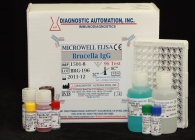 Brucella IgG ELISA kit
Brucella IgG ELISA kit
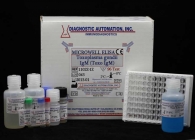 Toxo IgM ELISA kit
Toxo IgM ELISA kit
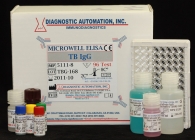 Mycobacterium Tuberculosis (TB) IgG ELISA Test
Mycobacterium Tuberculosis (TB) IgG ELISA Test
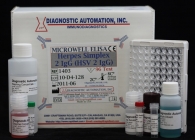 HSV-2 IgG ELISA kit
HSV-2 IgG ELISA kit








